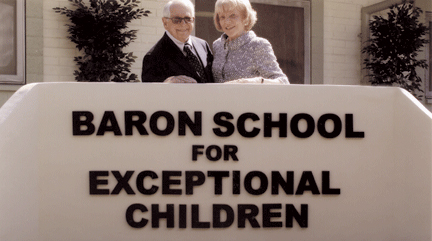
Class of ’41 | More than half a century ago, Henry Baron W’41 and his late first wife, Joan, brought a child who was mentally retarded and epileptic into the world. Though it can’t have been an easy time in their lives, the message that Baron wants to send out is the same positive one that his immigrant father used to give him: “If you are fortunate enough, leave a little behind.”
Baron has done more than a little to help the less fortunate, in steadily increasing increments. His most recent gift (with his second wife, Marcia) created the Baron School for Exceptional Children, an early-intervention center for children with autism and other challenges that is part of the Los Angeles-based Vista del Mar Child and Family Services organization. (Founded a century ago as the Jewish Orphans Home of Southern California, Vista del Mar has expanded in numerous ways since then, and one of its most significant components was the Julia Ann Singer School—which, thanks to the Barons’ gift, is now the Baron School.)
When Joan died in 2002, Baron established a memorial scholarship fund to bridge the gap between a child’s first diagnosis of autism to the time when public funding begins. Since then he and his family have increased their contributions, culminating in the Baron School, which accepts children of all races, creeds, and ethnicities. The school is designed for young children with severe emotional problems, behavior problems, learning disabilities, autism-spectrum disorders, and developmental delays. It is currently teaching and treating some 60 kids.
“If you get the child early, you have a chance to confront the problem and help them establish a more normal life,” says Baron, a real-estate executive who is “just retiring now” despite the fact that he will celebrate his 90th birthday next year. “They’ll never have a ‘normal’ life, but the earlier you get them, the better it is.
“I believe that this could be the beginning of a nationally regarded program” encompassing children of all ages, he adds. “Autism and other related disorders are such a broad-spectrum illness, and it is growing exponentially. Someday the government may recognize this problem and provide funding. But for now it must be funded through private resources.”
—S.H.




